Cold plunging has become a crucial part of my recovery and wellness routine. When I upgraded from the first-generation Plunge tub to the Plunge Air (one of the newest models in the company’s product lineup), I had high hopes that it would be the perfect replacement, thanks in part to its portability and relatively small footprint.
However, after setting it up and using it for a number of weeks, my excitement has faded somewhat. While the Plunge Air has some fantastic features, there are a few things that left me wanting more.
Key takeaways:
- The Plunge Air has a comfortable design with an angled backrest for a more relaxed plunging experience.
- The Evolve Standard Chiller has many of the typical chiller issues. It’s noisy, lacks an ozone generator, and requires chemicals to keep the water clean. (I recommend upgrading to the Pro Chiller for better performance, less noise and ozone sanitation.)
- Limited plumbing flexibility can make positioning the tub and chiller tricky, especially in smaller spaces. That’s a big issue since the Plunge Air is designed in part to offer a solution for plungers who need a tub with a smaller footprint.
- It’s best for casual plungers who don’t need extreme cold temperatures or the highest-end features.
In this review, I’ll break down my first-hand experience with the Plunge Air, including the Evolve Standard Chiller, the setup process and the tub’s overall performance.
First Impressions of the Plunge Air
When I received the Plunge Air, I was excited to upgrade from my first-gen Plunge tub, which had served me well but lacked a few modern features such as the ability to remotely turn it on and off and change the water temperature via a mobile app.
The Plunge Air is significantly roomier than my previous tub, measuring 61 inches long, 34 inches wide and 28 inches deep. It holds 105 gallons of water, making it spacious enough for someone like me, who’s six feet tall and broad-shouldered. With the previous-generation Plunge, either my feet or knees would stick out, thus preventing me from fully immersing myself in the cold water.
The angled backrest was one of the first features I noticed, and it made a huge difference during my plunges. In comparison to other cold plunge tubs (like the TheraFrost and the Inergize) which force you to sit upright, the Plunge Air allows you to lean back and relax. This design change made my longer plunges much more comfortable and helped me relax and focus on my breathing.
Setup Process: Challenges and Frustrations
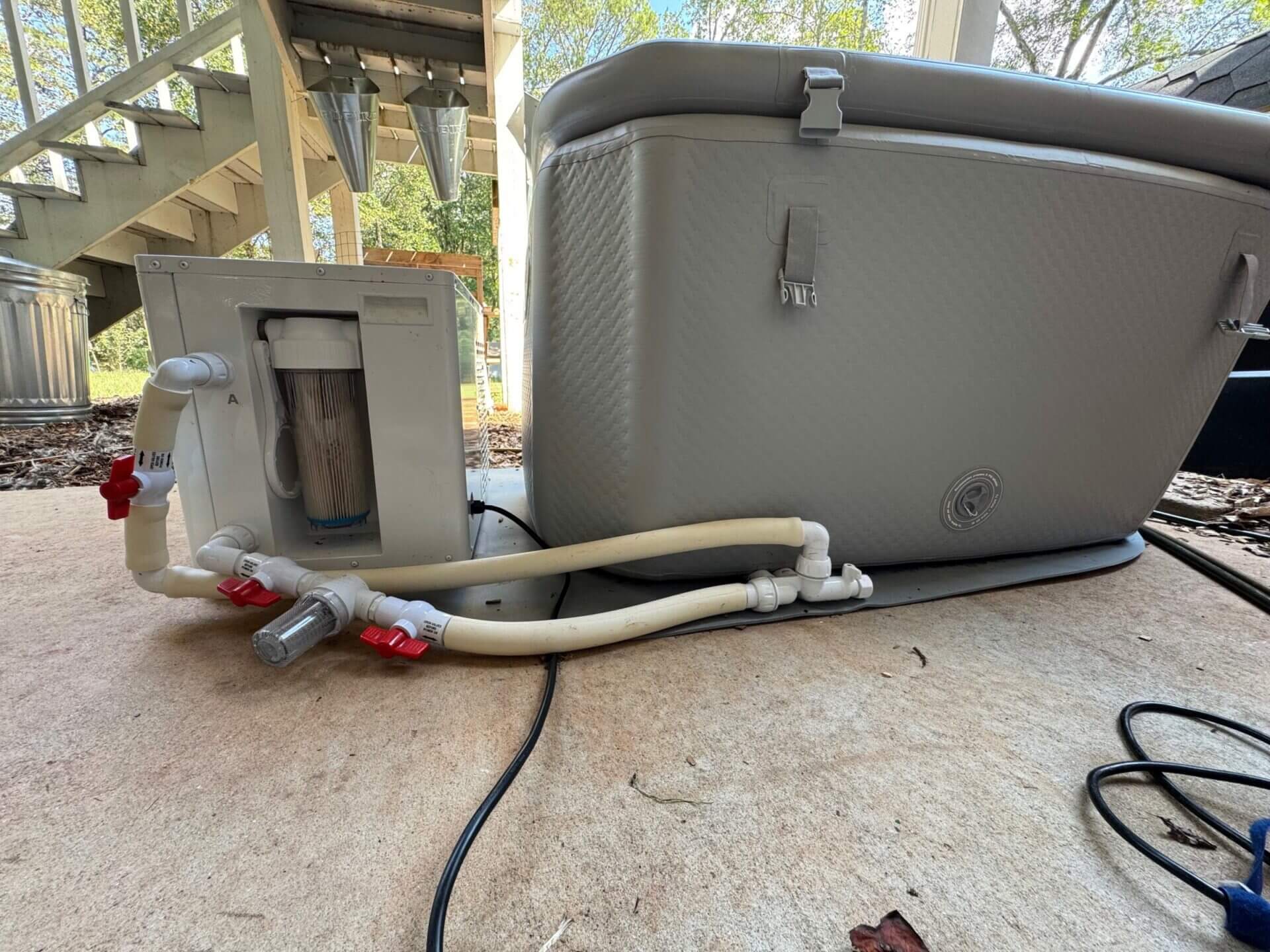
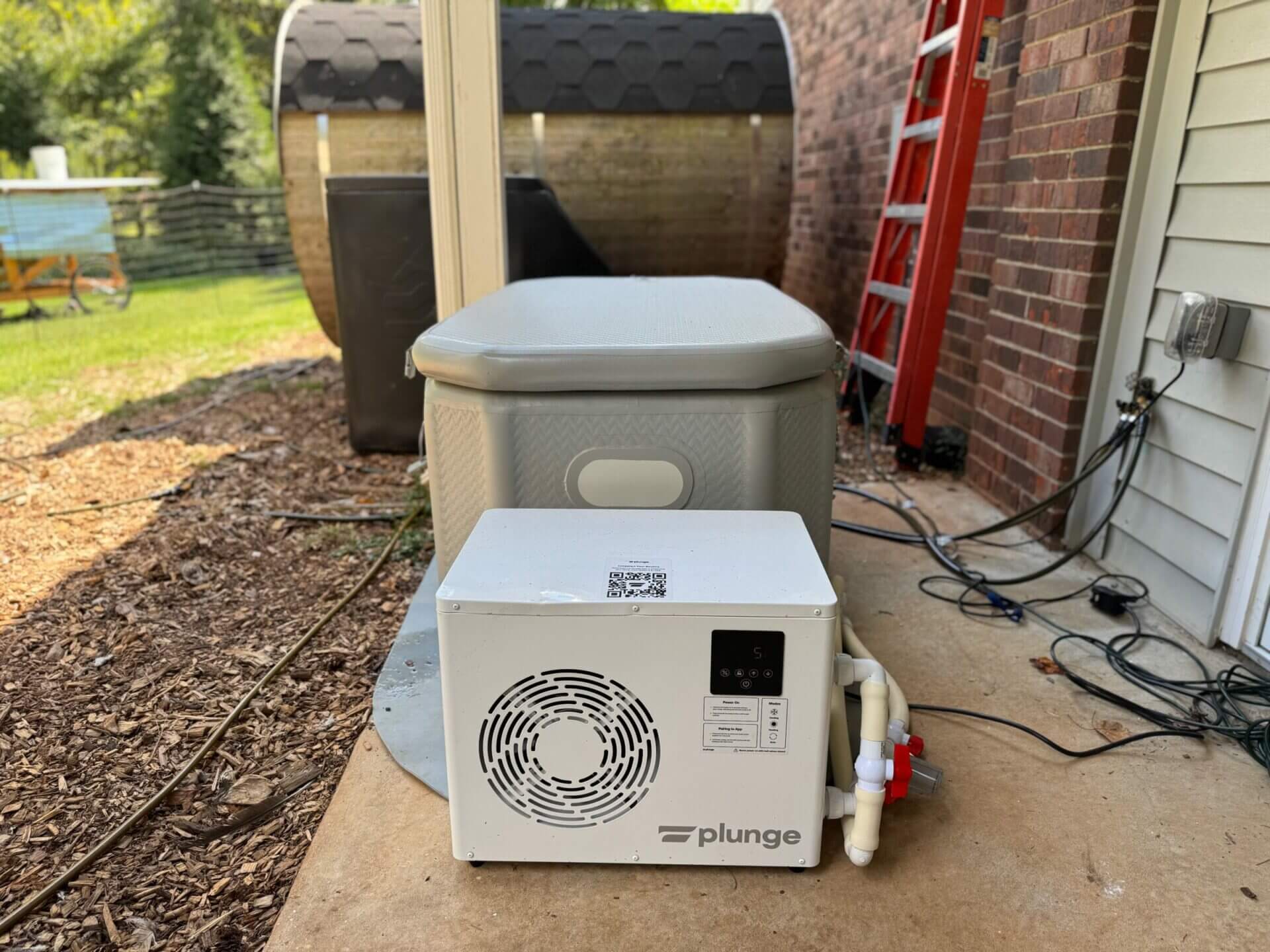
One thing I didn’t anticipate was how tricky the setup would be. The main issue stems from the Plunge Air’s plumbing design, which limits how you can position the tub and chiller.
In my outdoor setup, I didn’t have a ton of flexibility when it came to arranging the space, and the plumbing made it difficult to get everything just right. If you have a large open space, this might not be a big deal, but for tighter areas, it can be a source of frustration.
Specifically, the Plunge Air uses a combination of PVC and flexible piping with built-in elbows that only work when you position the chiller parallel to the end of the tub (where your feet point). You can’t place the chiller anywhere else or the plumbing won’t reach.
In comparison, many other brands (e.g., TheraFrost) use long, flexible hoses to connect the chiller to the tub. White that may not look as neat as what Plunge offers, the longer hoses offer more flexibility for placing the chiller on either side of the tub.
Another challenge was the lack of clear labeling on the fittings. To figure out how to connect everything, I had to scan a QR code and download instructions. This added an extra layer of complexity to the setup process, and I would have preferred color-coded or clearly labeled fittings to simplify things, such as is the case with my TheraFrost.
Performance: Evolve Standard Chiller vs. Pro Chiller


The performance of the Plunge Air largely depends on which chiller you choose. The base model comes with the Evolve Standard Chiller, which has a 1/2 HP motor and is capable of cooling the water down to 39 degrees. It includes both a sediment filter and 20-micron pleated filter, and while this setup does a decent job of removing debris and lint from the water, the lack of an ozone generator means you’ll need to use chemicals to keep the water clean.
The Pro Chiller, which I highly recommend upgrading to, cools the water down to 37 degrees and includes an ozone sanitation system that reduces the need for chemicals and ensures the water stays clean with less hassle. The Pro model is also much quieter than the Standard model, which is a big deal if you’re using the tub in a shared or outdoor space where noise can be a distraction.
That said, the difference between 37 and 39 degrees is minimal. Both temperatures are cold enough to trigger the body’s cold shock response, which leads to all the typical benefits of cold plunging (such as improved circulation, reduced inflammation, and enhanced recovery). And from a sensation standpoint, 37 and 39 feel about the same.
That said, if you’re a seasoned cold plunger, these temperatures may be a bit warmer than you’d like, and you may have to stay in water for a few extra minutes to start shivering (and reap all the health benefits) compared to water closer to the freezing point.
In other words, you could argue jumping into 33 degree water as opposed to 37 degree water saves you some time, which may or may not be important for you.
If you’re looking for lower temps, Morozko makes the coldest plunge I’ve ever tested, but it’s pricey. Meanwhile, the Sun Home Saunas Cold Plunge Pro cools water down to as low as 33 degrees and is priced about halfway between the Plunge Air (with the Pro Chiller upgrade) and the Morozko. Sun Home’s plunge is a good compromise between the two if your budget allows for it.
Noise and Convenience: Major Considerations
One of the biggest downsides of the Evolve Standard Chiller is the noise. It’s noticeably louder than the chiller on my first-gen Plunge, and if you’re using it indoors or in an outdoor living space (e.g., close to an outdoor dining table), that noise can quickly become a nuisance. I found the constant hum distracting when I was trying to enjoy some quiet time outside, and it was particularly annoying during meals or in the evenings when I wanted peace and quiet.
Aside from the noise, I was surprised to learn that the Plunge Air app (while useful and easy to navigate) does not allow you to schedule when the chiller turns on and off. That’s a feature I would love to see added in the future, because it would let me avoid running the chiller at night or during times when I know I’ll be outside. For now, you’ll have to remember to manually turn it off, which can be a hassle.
Speaking of the mobile app: it offers a convenient way to turn the chiller on and off, change the temperature and log plunging sessions. It also integrates with the Plunge Sauna so you can keep tabs on your contrast therapy sessions (if you own the sauna).
Pricing: Is the Pro Chiller Worth the Upgrade?
The base model of the Plunge Air with the Evolve Standard Chiller is priced at $3,500, which is fairly competitive when compared to other high-quality cold plunge options.
Using code MK at checkout will give you $250 off (and you can stack this discount on top of any existing Plunge sales or promotions).
However, if you can stretch your budget, I strongly recommend upgrading to the Pro Chiller. Yes, that means the setup will cost you about $5,000 in total, but the added ozone sanitation and quieter operation make it a worthwhile investment. And at that price, the setup is competitive with other high-end inflatables like the TheraFrost.
Plunge brand also makes both cheaper and more expensive tubs, which I compared here. I love their products in general, so if you decide the Plunge Air isn’t right for you, I would definitely recommend at least researching their other options. You can also see my list of the best cold plunge tubs for recommendations from other brands.
Who Is the Plunge Air For?
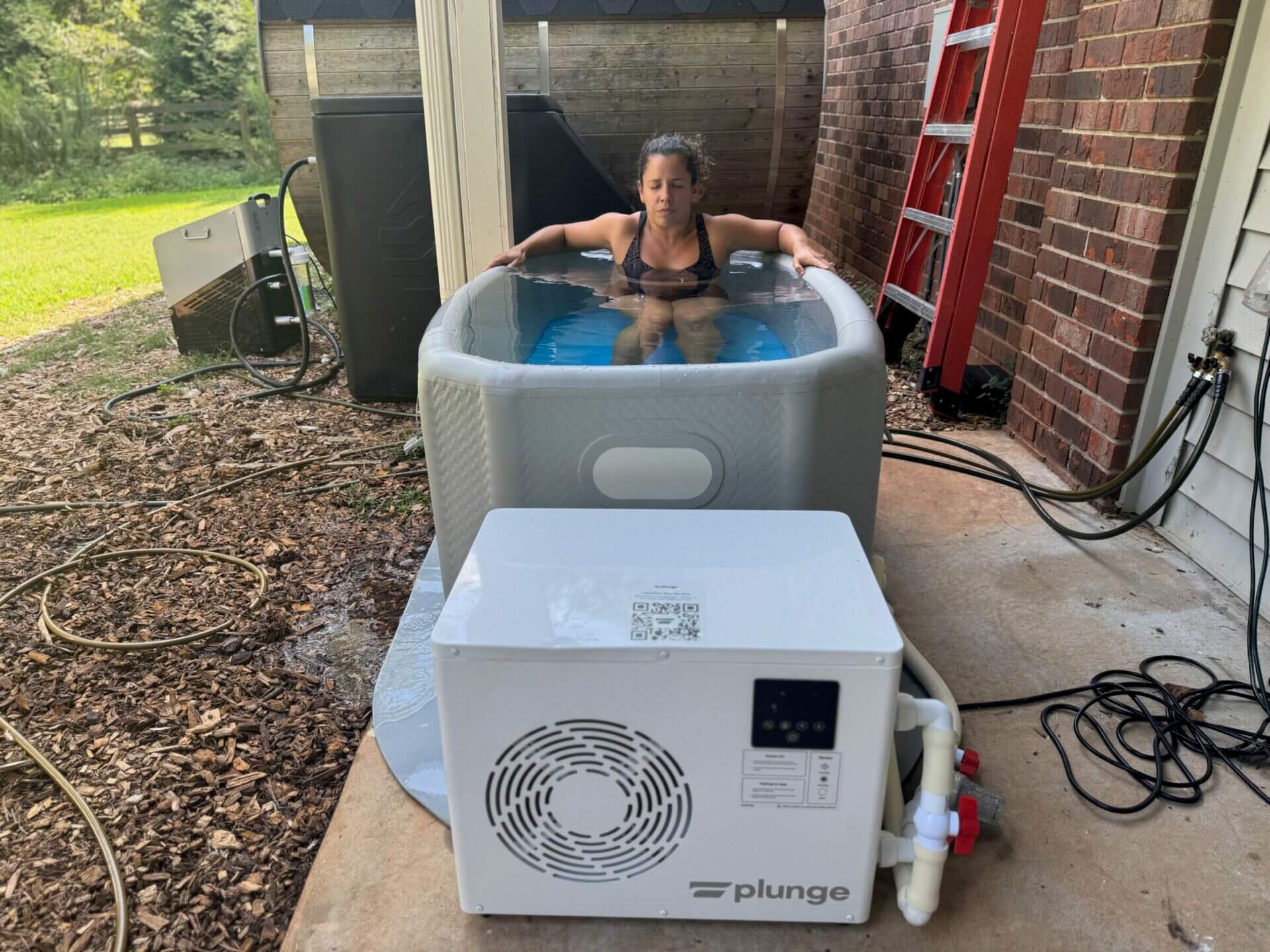
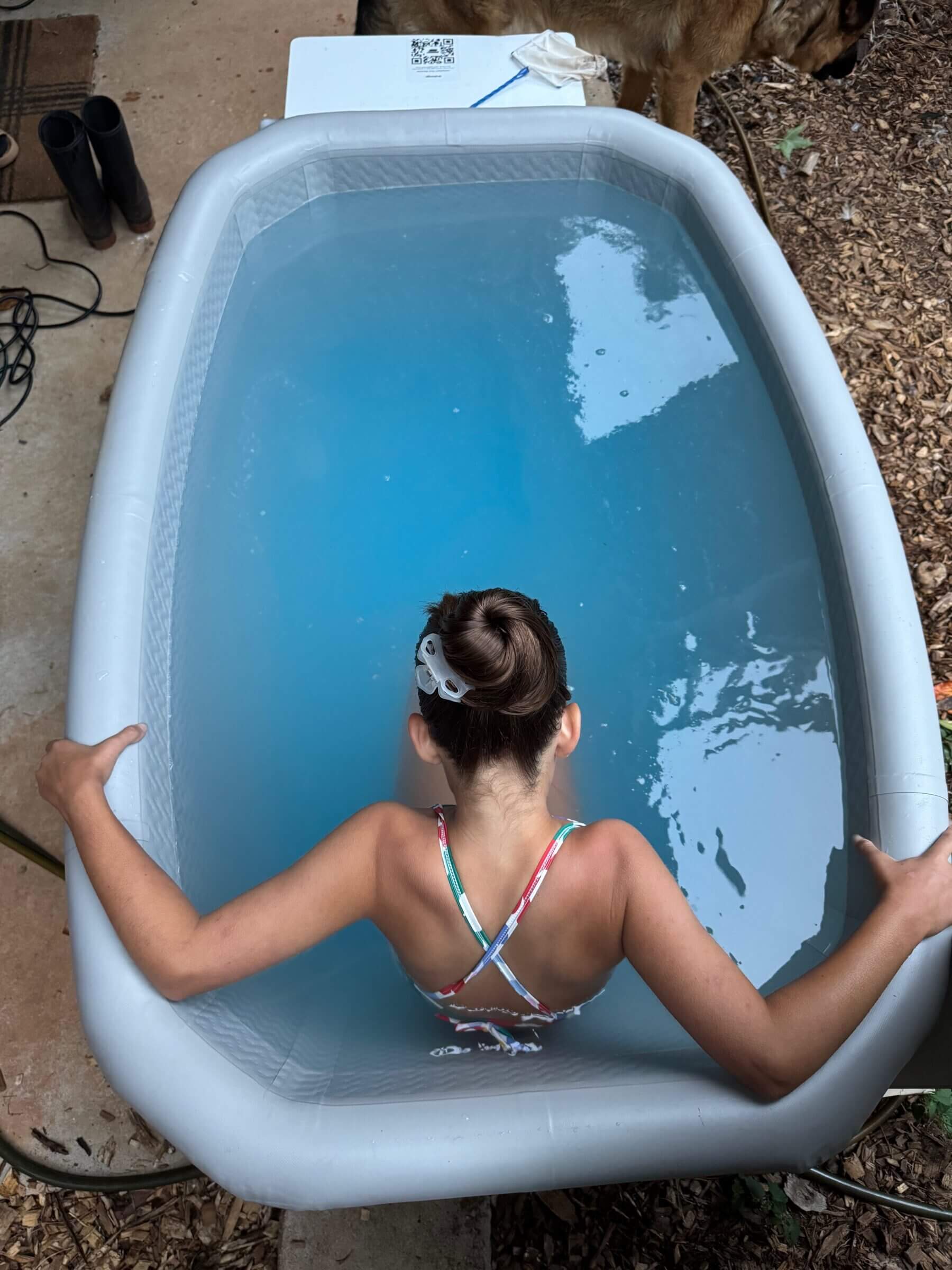
The Plunge Air is a great option for someone looking for a large, comfortable cold plunge tub without breaking the bank. It’s particularly well-suited for taller people, as the size of the tub allows for full submersion without feeling cramped. The angled backrest is another plus for those who want to relax during their plunge, as it allows you to lean back instead of sitting upright.
If you’re a casual cold plunger who doesn’t need the water to be ultra-cold all the time, the Plunge Air with the Evolve Standard Chiller will work just fine. My wife, for instance, likes her water around 50°F, and the Plunge Air has been perfect for her. She doesn’t mind the need for chemicals because she doesn’t plunge as frequently as I do. (And I’m the one administering them, so she trusts me not to use anything dangerous.)
On the other hand, if you’re used to high-end cold plunges like the Morozko Forge or Sun Home Saunas Cold Plunge Pro, you might find the Plunge Air lacking in a few areas. The chiller noise, lack of ozone sanitation, and lower water circulation could be deal-breakers for more experienced users who want the best performance possible.
Final Verdict: The Plunge Air Is a Solid Tub With Notable Downsides
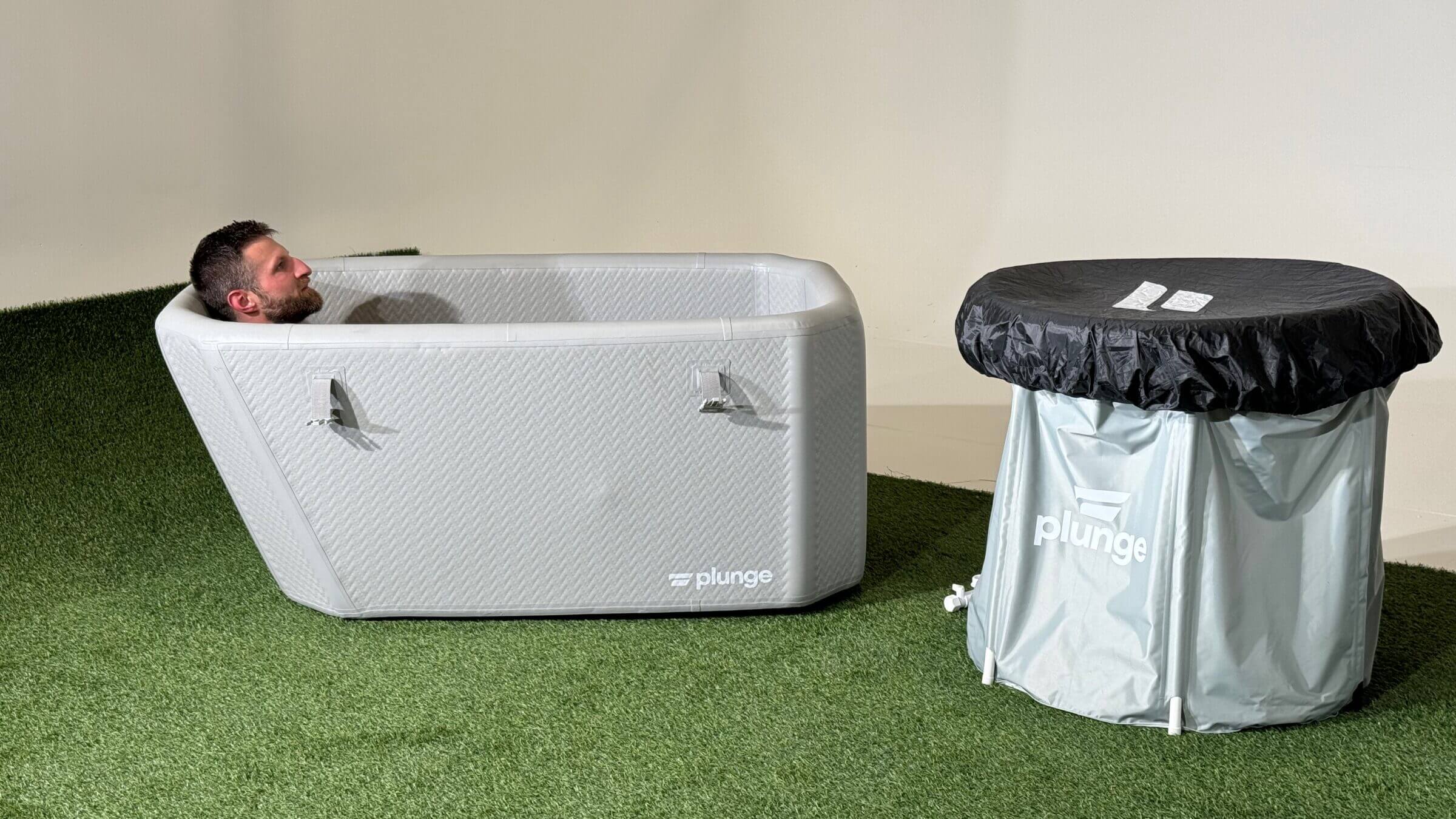
The Plunge Air is comfortable, functional, and affordable compared to many other options, but the chiller noise and lack of ozone sanitation are definite drawbacks. For those reasons, it’s not going to be my go-to tub —that title still belongs to my Sun Home Saunas Cold Plunge Pro.
However, the Plunge Air works great for my wife, and I can see it being a fantastic option for casual users or those looking for a more affordable way to get into cold plunging. If you’re thinking about purchasing a Plunge Air, I’d highly recommend upgrading to the Pro chiller for the best experience.
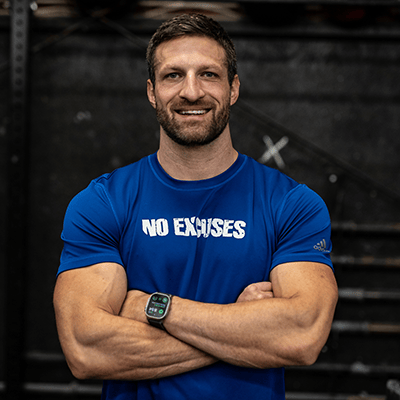
Michael Kummer is a healthy living enthusiast and CrossFit athlete whose goal is to help people achieve optimal health by bridging the gap between ancestral living and the demands of modern society.
Medical Disclaimer
The information shared on this blog is for educational purposes only, is not a substitute for the advice of medical doctors or registered dieticians (which we are not) and should not be used to prevent, diagnose, or treat any condition. Consult with a physician before starting a fitness regimen, adding supplements to your diet, or making other changes that may affect your medications, treatment plan or overall health. MichaelKummer.com and its owner MK Media Group, LLC are not liable for how you use and implement the information shared here, which is based on the opinions of the authors formed after engaging in personal use and research. We recommend products, services, or programs and are sometimes compensated for doing so as affiliates. Please read our Terms and Conditions for further information, including our privacy policy.

